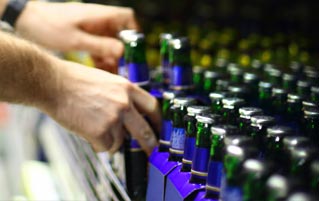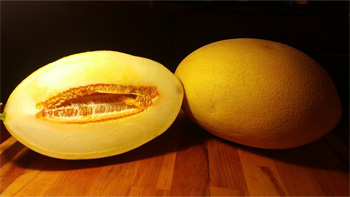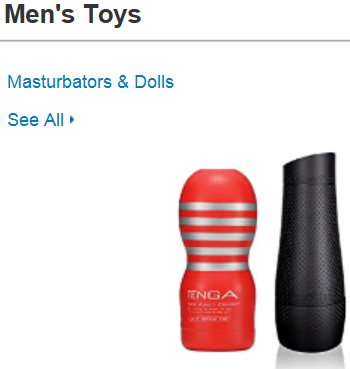The 5 Dumbest Corporate Slapfights That Affect What You Buy

In the course of one trip to Amazon to order beer, Pringles, and a dildo, you've accidentally entangled yourself in dozens of petty corporate slapfights going on behind the scenes. The jockeying for everything from shelf space to label wording is both brutal and absurd. For example ...
Sex Toy Sellers Have To Jump Through Ridiculous Hoops
Humanity has been crafting objects to shove into our orifices for millennia, but several states -- mostly ones associated with twanging banjos -- still have laws on the books that ban sex toy sales. So until some brave legislator is willing to risk embarrassment by sponsoring a Free the Dildos bill, people in states like Alabama and Georgia have had to, appropriately, get creative.

Alabama's Sherri Williams, for example, took advantage of the law the same way that opportunistic pot dealers do. Alabama's anti-obscenity laws allow sex toys to be sold if they're used for vaguely defined "medical, scientific, educational, legislative, judicial, or law enforcement" purposes. Basically, they're legal as long as you promise not to enjoy them, so Williams simply has her customers fill out an anonymous medical form before they buy toys from her drive-through store. Be careful about accepting her offer to supersize.
Sex toys purveyors also face obstacles online, because despite all of the porn tabs you have open right now, it can hard to get their products in the right place, so to speak. Social media sites like Facebook prohibit explicit content, because you absolutely don't want to know what sex toys your parents and exes are interested in, but Facebook ads draw way more eyeballs than ads on picturesofmariotakingitfromtransformers.com. So one sex toy company, Lioness, advertised with a Facebook video in which women read PG customer feedback about how great their product was. Then they linked to a YouTube video, which in turn linked to their website, because trying to advertise sex toys online is like trying to advertise a speakeasy.

Another company took advantage of the fact that Facebook allows the advertisement of condoms (safe sex is important as long as it's not fun) by buying a condom company, running Facebook ads for those condoms, then advertising their toys on the page people would see when they clicked through.
But the real money is made on Amazon, which can be just as tricky. First, if you want to make it into Amazon's "Sexual Wellness" section, you need to have 50 sales of a non-sexual product, which Amazon says is for quality purposes. You have to prove that you're serious about giving Amazon customers a more fulfilling orgasm, and aren't trying to make a quick buck with butt plugs made of asbestos and spider eggs.


But even then, customers have to know that section exists and purposefully visit it -- otherwise vibrators, dildos, and their sexy ilk won't show up in search results. So companies have started labeling their vibrators as massagers, muscle relaxers, and even selling them alongside water bottles ... anything to get their product in front of virgin eyes. So try not to giggle too much when your grandpa shows you that great new muscle relaxer he found for unwinding after a day of golf.
Food Manufacturers Keep Suing Over The Exact Definition Of Foods
Soy milk, almond milk, and other non-moo-cow milks have been cutting into the market share of American dairy farmers, despite the fact that they taste like the water that was just used to wash a chalk board. The latest volley in this nearly 20-year-old war is the Dairy Pride Act, which if passed would require the FDA to enforce its standards so only milk from the "lacteal secretion of hooved mammals" could be identified as milk on the label. It sounds kinda gross when put like that, but the dairy industry spends nearly $6.5 million a year on such lobbying efforts to force the products to be named "Almond Water" or something. The non-milk milk industry's counter-argument is that consumers are smart enough to know that almonds and cow are different, and if you really think about it, what is milk, anyway? Maybe we're all just drops of milk in an almond called the Universe.
Not every dairy producer is fortunate enough to be on the offensive in the Labeling Wars. Kraft Foods had to deal with the embarrassment of their Kraft Singles being slapped with censures from the FDA for having the gall to call the used tires they've shaved and dyed orange "cheese." Since it isn't made from at least 51 percent real dairy, it's official labeled "Pasteurized Prepared Cheese Product," though it's not clear if those three additional useless words have ever stopped a single person from buying it.

Pringles has also come under scrutiny. When they were first released in the 1970s, other chip companies spent years arguing that Pringles were not real chips, since they're only made with about 40 percent potatoes (the other 60 percent is a paste of corn, rice, and wheat flours, plus other things like Dextrose, which we believe was also a G.I. Joe villain). The FDA agreed, and ordered Pringles to be labeled as "Potato chips made from dried potatoes." Pringles instead changed their snack to a "potato crisp," which both sounds more appetizing and could maybe trick some British tourists.
OK, but even if we don't understand what exactly our food is called, we can still trust all those health labels on them, right? Aw, you're adorable. In 2015, the controversial Academy of Nutrition and Dietetics awarded Kraft Singles a "Kids Eat Right" label, only for it to be removed by the end of the month amidst criticism that the AND is too close to food companies. Meanwhile, Campbell's has been sued twice in the last five years for not disclosing to the FDA that it paid the American Heart Association for endorsements of its soup. A can of Campbell's can have over six times the recommended amount of sodium for such a product, and contains harmful trans-fat inconsistent with a "Heart Healthy" label, but would be perfect for a label where a heart is sickly, struggling, and clearly ready to die.

Companies Keep Redefining Their Products To Avoid Tariffs
The idea behind tariffs is to protect domestic industries by keeping them competitive against foreign goods. So, for example, a shirt made in China is going to cost you a little more than a shirt made in the USA. But because many definitions are artificial and vaguely defined under the law ("This isn't a shirt, it's a blouse for men!"), the situation can get goofy in a hurry.
For example, the creators of the Snuggie won the right for their product to be defined as a blanket, not a piece of clothing, so they'd only have to pay an 8.5 percent tax instead of 15 percent. Pillow Pets won a similar fight, and are now allowed to be classified as stuffed animals, because pillows are subject to tariffs, while toys are not.

Back in the '60s, in response to a chicken tariff in Europe (don't ask), President Johnson instituted a 25 percent tariff on "light trucks" (like the popular Volkswagen Van that hippies rode around in at the time, because in the legal world vans count as trucks), to the detriment of Ford once they started production of such a van in Turkey in 2002. Their response? Ford Transit Connects were shipped over with extra seats installed to make it a "passenger van" -- which, once through customs, were quickly removed and recycled so the back half of the vehicle could be reassembled and the car could be magically transformed into a "cargo van." The government finally cracked down on Ford's chicanery ... in 2013.
Subaru pulled a similar trick in the '70s and '80s with their BRAT coupes, installing cheap seats and shoddy seat belts in the cargo bed so they could call it a passenger vehicle and be subject to a paltry 2.5 percent tariff instead of that brutal 25 percent charge. Because the world is fine with fluid definitions as long as profit is involved.

HEADS ON ASPHALT
Food isn't immune to these shenanigans either. Remember the Pringles situation from a few paragraphs ago? Well, a British judge ruled that Procter and Gamble owed $160 million in back taxes because Pringles are potato chips (and taxed at a higher rate than mere "snacks"), despite P&G's best efforts to convince the judge that Pringles are "savory snacks." Pringles would have you believe that their food exists in a quantum state, their exact characteristics dependent on their current location's tax law.

These kinds of fights have been going on in America for over a century. In 1889, Roberston v. Saloman saw arguments on whether white beans should be taxed as food or as garden seeds. And in case you ever want to be that guy at a dinner party, an 1893 court case found that tomatoes should officially be classified as vegetables for tariff purposes, on the legal basis of everyone already thinks they're veggies despite what science says.
America Takes Advantage Of A Century-Old Treaty To Sell Knockoff Champagne
You've probably heard that champagne is only really champagne if it comes from the Champagne region of France, kind of like how true Kobe beef only comes from Kobe, Japan, and how only one specific industrial waste management plant in East St. Louis is allowed to manufacture Necco Wafers. Champagne's champagne became associated with royalty and obtained a reputation for being the best damn booze around, and for centuries France took legal steps to ensure that their branding was protected. The rest of the world mostly complies. Italy's equivalent to champagne is Prosecco, Spain has Cava, Canadians pour Labatt into a flute glass, and so on. But the United States continues to let manufacturers cram anything short of antifreeze into a bottle and call it champagne, because this is the land of the free, goddammit, and that includes the freedom to pop open the screw top on an eight-dollar bottle of fine North Dakotan champagne to celebrate getting through another Tuesday.
The issue goes back to World War I and the Treaty of Versailles, obviously. The French economy, especially the Champagne region, had been devastated by the war, so the sprawling treaty included a clause that granted France worldwide protection for the champagne brand. France got a valuable exclusive product to help kick-start their economy, other nations could get drunk on it, and the whole thing seemed like a win-win. But the United States never ratified the treaty for totally unrelated reasons, which meant that America became a sparkling wine loose cannon that didn't have to play by The Man's stuffy rules.
France finally got America to agree to retire the champagne name in 2005, but that only applied to new products -- most manufacturers that were already making "champagne" were protected by a grandfather clause. The French government was presumably informed of that little catch by a U.S. official who insisted that Andre champagne is an American cultural treasure, right before blasting some Pitbull and chugging an entire bottle.
A Whole Lot Of Secret Interests Are Keeping You From Buying Beer
Everyone pretty much agrees alcohol shouldn't be sold to children (bars would become unbearable), but ideally that'd be about it as far as legal restrictions go. Well, if you've tried to buy booze in the USA, you know that nobody gives a shit about you or what you consider ideal. Restrictions on buying alcohol on Sundays are relatively common, and there are hundreds of "dry" counties in America which still ban the sale of alcohol altogether. But then there are other interest groups controlling how you buy hooch, and it has nothing to do with their concern for your soul or liver.
One set of combatants fighting over the right to get you drunk are liquor stores and grocery stores, since several states have laws saying what can and can't be sold at each. Restrictions on beer sales date back to the end of Prohibition, when the alcohol by volume ceiling was updated from 0.5 percent to 3.2 percent. Despite subsequent changes, grocery and convenience stores in states like Minnesota and Kansas are still only allowed to sell alcohol below 3.2 percent (for reference, Bud Light's vaguely beer-flavored water has an ABV of 4.2 percent), while liquor stores have free reign. Other states' liquor stores, like those in Indiana and Oklahoma, upped the ante by lobbying to keep convenience and grocery stores from selling cold beer, based on the unconvincing idea that selling cold beer requires an entirely different set of regulatory standards than warm beer.

Meanwhile, the people who make the beer are having their own problems getting it to you. The rise of the craft beer industry has created hundreds of new beers to sample, but distributors (the middlemen between breweries and retailers) have lobbied to protect their profits. Instead of trusting breweries to distribute, North Carolina law requires any brewery making more than 25,000 barrels a year to use an independent distributor (which, in a total coincidence, are starting to be purchased by big manufacturers like Anheuser-Busch). So craft breweries have to either give up a chunk of their profits or artificially limit how much beer they make.
If you enjoy having options beyond Budweiser, Coors, and the harsh light of sobriety, these regulations make a difference. Mississippi and Georgia breweries have been forced to implement tour systems, which charge visitors for a tour while offering up to 30 oz. of "free" beer, regardless of whether the customer takes the tour. You can't just buy beer to take home, nor can you buy a more expensive "tour" in relation to the amount of beer you want. Georgia lawmakers have had over half a million in campaign contributions from distributors, and as a result, Georgia has the 48th fewest breweries in the country, while Mississippi ranks dead last. That's enough to make someone want to get into meth.
James has a Twitter, and has recently tried his hand at blogging.
For more looks at corporate operations you'll wish you didn't know, check out The 5 Most Purely Evil Leaked Memos From Famous Companies and 16 Diabolical Acts of Evil by Famous Corporations.
Subscribe to our YouTube channel, and check out If Theme Parks Were Honest, and other videos you won't see on the site!
Follow us on Facebook, and we'll follow you everywhere.
